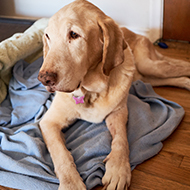
The veterinary surgical registry is the first of its kind.
RCVS Knowledge has launched the Canine Cruciate Registry - an anonymised data collection audit tool that is free to use.
The Canine Cruciate Registry will be used to collect data from veterinary professionals and dog owners on patients recovering from cruciate surgery to identify which techniques and procedures give the best and safest outcomes.
Despite injury to the cruciate ligament being the most common type of orthopaedic problem in dogs, RCVS Knowledge has identified a lack of high-quality evidence comparing surgical techniques and implants for effectiveness and fewest complications.
As such, RCVS Knowledge has launched the registry as a way to provide this evidence to veterinary surgeons worldwide, to assist with decision making for dealing with canine cruciate ruptures.
Mark Morton, clinical lead for the Canine Cruciate Registry, commented on the launch: “We want to work with as many vets and dog owners as possible, we want to know about complications, we want to know about different techniques and how dogs recover so we can build a knowledge base for vets around the world to improve the quality of care they provide.
“I invite all vets in the UK as well as owners caring for dogs having cruciate surgery to join us and help improve outcomes for all patients in the future.”
Working with Amplitude Clinical Outcomes to develop the registry, the registry involves a web-based series of questions, which veterinary surgeons and dog owners are then requested to complete throughout the dog's care and experience.
Orthopaedic surgeon Richard Whitelock commented on the registry: “The benefits of the Canine Cruciate Registry are immense – for dogs, owners and veterinary surgeons.
“Owners will be able to make better-informed decisions and their feedback on outcomes will be included. Surgeons will be able to monitor and compare their results, adapting and improving their treatments accordingly.
“I believe that the Canine Cruciate Registry could trigger a widespread change in the veterinary profession, we look forward to owners and surgeons across the UK engaging with it.”
More information on the Canine Cruciate Registry can be found here.



 The latest
The latest